
Acinonyx is a genus within the cat family. The only living species of the genus, the cheetah, lives in open grasslands of Africa and Asia.
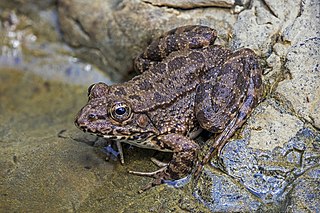
True frogs is the common name for the frog family Ranidae. They have the widest distribution of any frog family. They are abundant throughout most of the world, occurring on all continents except Antarctica. The true frogs are present in North America, northern South America, Europe, Africa, and Asia. The Asian range extends across the East Indies to New Guinea and a single species, the Australian wood frog, has spread into the far north of Australia.

The southern frogs form the Leptodactylidae, a name that comes from Greek meaning a bird or other animal having slender toes. They are a diverse family of frogs that most likely diverged from other hyloids during the Cretaceous. The family has undergone major taxonomic revisions in recent years, including the reclassification of the former subfamily Eleutherodactylinae into its own family the Eleutherodactylidae; the Leptodactylidae now number 206 species in 13 genera distributed throughout Mexico, the Caribbean, and Central and South America. The family includes terrestrial, burrowing, aquatic, and arboreal members, inhabiting a wide range of habitats.
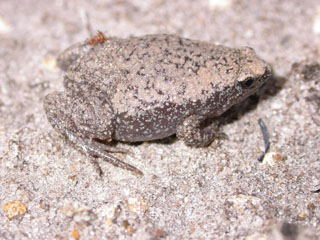
The Microhylidae, commonly known as narrow-mouthed frogs, are a geographically widespread family of frogs. The 683 species are in 57 genera and 11 subfamilies.

The Natricinae are a subfamily of colubroid snakes, sometimes referred to as a family (Natricidae). The subfamily comprises 36 genera. Members include many very common snake species, such as the European grass snakes, and the North American water snakes and garter snakes. Some Old World members of the subfamily are known as keelbacks, because their dorsal scales exhibit strong keeling.

The Colubrinae are a subfamily of the family Colubridae of snakes. It includes numerous genera, and although taxonomic sources often disagree on the exact number, The Reptile Database lists 717 species in 92 genera as of September 2019. It is the second largest subfamily of colubrids, after Dipsadinae. Many of the most commonly known snakes are members of this subfamily, including rat snakes, king snakes, milk snakes, vine snakes, and indigo snakes.

Helicidae is a large, diverse family of small to large, air-breathing land snails, sometimes called the "typical snails."

Vertiginidae, common name the whorl snails, is a family of minute, air-breathing land snails, terrestrial pulmonate gastropod molluscs or micromollusks in the superfamily Pupilloidea.

Physidae, common name the bladder snails, is a monophyletic taxonomic family of small air-breathing freshwater snails, aquatic pulmonate gastropod molluscs in the superfamily Lymnaeoidea.
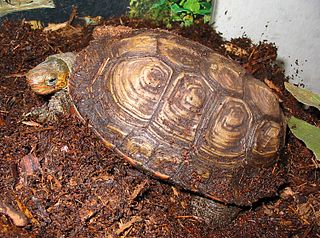
Rhinoclemmys is a genus of turtles in the family Geoemydidae, the only genus in the subfamily Rhinoclemmydinae. Member species of the genus are commonly known as the Neotropical wood turtles and are the only geoemydids known from the Americas. As such, they have adapted to a wide range of habitats, which is reflected in the species' common names.

The Alethinophidia are an infraorder of snakes that includes all snakes other than blind snakes and thread snakes. Snakes have long been grouped into families within Alethinophidia based on their morphology, especially that of their teeth. More modern phylogenetic hypotheses using genetic data support the recognition of 19 extant families, although the taxonomy of alethinophidian snakes has long been debated, and ultimately the decision whether to assign a particular clade to a particular Linnaean rank is arbitrary.
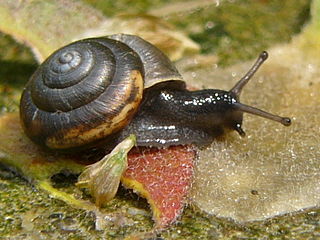
Hygromiidae is a taxonomic family of small to medium-sized air-breathing land snails, terrestrial pulmonate gastropod mollusks in the superfamily Helicoidea.

Scincinae is a subfamily of lizards. The subfamily contains 33 genera, and the genera contain a combined total of 284 species, commonly called skinks. The systematics is at times controversial. The group is probably paraphyletic. It is one of three subfamilies of the family Scincidae, the other two being Acontinae and Lygosominae.

Oxychilidae is a taxonomic family of air-breathing land snails, terrestrial pulmonate gastropod mollusks in the superfamily Gastrodontoidea.
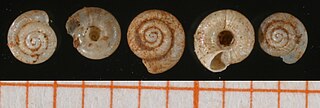
Pristilomatidae is a taxonomic family of air-breathing land snails, terrestrial gastropod mollusks in the superfamily Gastrodontoidea.

The frog family Dicroglossidae occurs in tropical and subtropical regions of Asia and Africa, with most genera and species being found in Asia. The common name of the family is fork-tongued frogs.
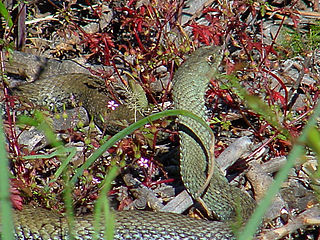
Psammophiidae is a family of elapoid snakes. They were formerly placed as a subfamily of the Lamprophiidae, but have been more recently identified as a distinct family.

The Lamprophiidae are a family of snakes found throughout much of Africa, including the Seychelles. There are 89 species as of July 2022.

Dipsadinae is a large subfamily of colubroid snakes, sometimes referred to as a family (Dipsadidae). They are found in most of the Americas, including the West Indies, and are most diverse in South America. There are more than 700 species.
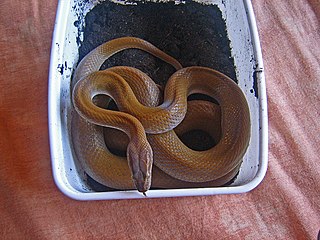
Lamprophiinae is a subfamily of lamprophiid snakes, a large group of mostly African snakes, most of which were formerly classified as colubrids but which we now know are actually more closely related to elapids.




















